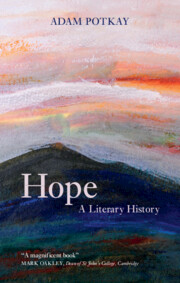Book contents
- Hope: A Literary History
- Hope
- Copyright page
- Contents
- Preface
- Introduction For and Against Hope
- 1 The Limits of Hope in the Ancient World
- 2 Eternal Hope: The Christian Vision
- 3 The Three Hopes of Humanism: Sacred, Profane, and Political
- 4 Something Evermore About to Be: Hope in the Romantic Era
- 5 Later Nineteenth-Century Responses to Romantic Hope
- 6 Modernism: Repetition, Epiphany, Waiting
- Notes
- Acknowledgments
- Index
Introduction - For and Against Hope
Published online by Cambridge University Press: 27 January 2022
- Hope: A Literary History
- Hope
- Copyright page
- Contents
- Preface
- Introduction For and Against Hope
- 1 The Limits of Hope in the Ancient World
- 2 Eternal Hope: The Christian Vision
- 3 The Three Hopes of Humanism: Sacred, Profane, and Political
- 4 Something Evermore About to Be: Hope in the Romantic Era
- 5 Later Nineteenth-Century Responses to Romantic Hope
- 6 Modernism: Repetition, Epiphany, Waiting
- Notes
- Acknowledgments
- Index
Summary
Is hope a virtue? Not necessarily. We hope for many things, some of them good, some bad. What we do or don’t do about our hopes may also reflect on us, for better or for worse. Is hope pleasurable or comforting? Again, not necessarily. Hope may involve anxiety and pain. What about hopes in as well as for others? As good and generous as such hopes may sound, even they are not necessarily virtuous. If hope appears an unqualified good to you, independent of any specific context, it is likely for one of two reasons: first, you belong to or have been influenced by one of the Abrahamic faiths (Judaism, Christianity, Islam), in which faith-based hope counts as a virtue; second, you are a political liberal. Starting with supporters of the French Revolution, hope has served as shorthand for progressive politics. I start my literary history with the classical counterpoint, in which hope is at best problematic, something in need of regulation and restraint if not extirpation. I then turn to Judeo-Christianity, and European and American Romanticism, and offer a preliminary sketch of the reasons why hope features as a good thing in these over-lapping but distinct contexts.
Keywords
- Type
- Chapter
- Information
- Hope: A Literary History , pp. 1 - 28Publisher: Cambridge University PressPrint publication year: 2022

